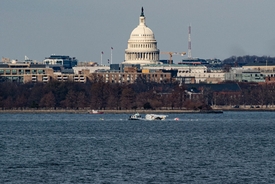The missile that downed flight MH17 was fired from a Russian military system, an international team of investigators have said.
Travelling from Amsterdam to Kuala Lumpur, the Malaysia Airlines Boeing 777 was shot down over the conflict zone in eastern Ukraine on 17 July 2014, killing all 298 passengers and crew on board.
Soon afterwards, the Russian military was accused of being complicit in the downing of the plane, but denied all involvement in the incident, claiming they had not sent troops into eastern Ukraine and that none of their weapons had been used.
However, at a press conference in The Hague on Thursday, Wilbert Paulissen, a Dutch official from the Joint Investigation Team (JIT), told reporters that, after studying all available photos and footage, the team of investigators had been able to trace the convoy to Russia's 53rd brigade, which consists of 300 people and is based in Kursk in western Russia.
Speaking at a presentation of the interim results of the long-running investigation, he stated: "All the vehicles in a convoy carrying the missile were part of the Russian armed forces," adding that they had "legal and convincing evidence which will stand in a courtroom".
Confirmation that the Russians were involved in the incident has been a long time coming. In October 2015, the Dutch Safety Board concluded that the plane had been hit by a Buk missile system, a surface-to-air missile system first introduced by the Soviet army in 1979.
Officials from the Netherlands, Australia, Belgium, Malaysia and Ukraine reached a similar conclusion in a 2016 preliminary report, however, Russia refused to accept blame. In response to the news, Kremlin spokesman Dmitry Peskov told the BBC: "We cannot accept as final truth of what they say. I bet you haven't seen any proof." In addition, there have been reports of Russian state-linked media floating a range of theories, suggesting that Ukraine was responsible for shooting down the plane.
The Russian Federation blocked the United Nations from creating an international tribunal to determine guilt in the case, using its UN Security Council veto and arguing that such a court case could "politicise" the issue. This means that any eventual trial would be held in the Netherlands under Dutch law.
Chief prosecutor, Fred Westerbeke, stated on Thursday that the investigation was now in its “last phase” but declined to state when he would be ready to file indictments, or to reveal anything else about the evidence they had. He did say, however, that the number of people under suspicion of direct or indirect involvement in the crime was now down to "several dozen". Two years year, it was reported to be about 100 people.

